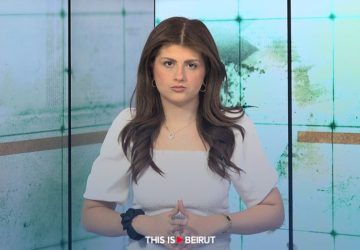Listen to the article
Lebanon is drafting a response to a memorandum from Damascus protesting against the border control towers, which were erected over a decade ago by the British government, between the Arida coastline in northern Lebanon and the slopes of Mount Hermon in the south.
The Lebanese Army, overseeing these observation posts, is meticulously preparing a technical rebuttal to the accusations of the Syrian government, which challenges the “reliability” of the towers. Damascus alleges that the surveillance equipment outfitted in these structures allows the transmission of significant intelligence information to the Israelis via the British, who allegedly have access to the data gathered in these structures.
Bashar el-Assad’s regime claims that these “intelligence” reports disclose activities within Syrian territory, allegedly enabling targeted Israeli strikes. Essentially, Damascus accuses the Lebanese Army of sharing military intelligence with foreign entities, ultimately favoring Israel. This accusation has sparked significant controversy within opposition circles in Lebanon.
“The information gathered by these posts is in no way directed towards any other organizations or governments aside from Lebanon,” emphasizes retired general and former director of operations within the Army, Maroun Hitti. “It is strictly restricted for the Lebanese Army and the Ministry of Defense, especially given the absence of foreign presence within these observation towers,” he clarifies.
“Technically and scientifically wise, this claim is simply unfounded,” argues a military official, speaking confidentially, countering the Syrian accusations. “No targeted strike or attack can be carried out without the human factor. Even with the most advanced technological capabilities, success in such undertakings is contingent upon human intervention,” he explains, referring to Israeli airstrikes that targeted Hezbollah operatives and Iranian Revolutionary Guards in Damascus.
Furthermore, he asserts, “While technology has a major role, the success of all targeted operations in Lebanon and Syria is largely attributed to the infiltration of operatives within pro-Iranian networks.”
He believes that Syria’s current objections to these towers stem from Damascus’s wish to hide the truth behind Tel Aviv’s successful targeting of pro-Iranian leaders. He believes that “spies, or even intelligence services, including Syrian ones, are providing Israel with vital information, allowing them to carry out these assassinations successfully.” As an example, he points to the attack on Hamas leaders in Beirut’s southern suburbs.
In other words, Hitti suggests that “Syria seems to be trying to deflect such accusations by positioning itself as a victim of the activities conducted by the observation towers on Lebanon’s northern border.”
An Extension of the Project in Southern Lebanon
Another explanation can be put forward for this late Syrian reaction against the control towers. One that could be linked to Hezbollah.
During the early February visit of British Foreign Secretary David Cameron to Beirut, Britain suggested the installation of control towers at the southern border following the cessation of hostilities between Hezbollah and Israel. However, this suggestion would not sit well with Hezbollah. In an interview with This is Beirut, Maroun Hitti stated that Hezbollah would “feel threatened” by such a plan. For what reason? “If this initiative extends to the southern region beyond the Litani River, it would bolster the presence and authority of the Lebanese Army, thus diminishing Hezbollah’s control in the area,” he elaborates.
“However, given that the pro-Iranian party cannot openly afford to oppose such a project, risking accusations of betrayal against the Lebanese state, Syria is the one delivering the complaint,” explains Hitti.
However, the above-mentioned military official disagrees with this assessment. He believes that the project to extend control towers across the entire border will inevitably materialize once the conflict between Hamas and Israel wraps up.
According to that same military official, this project will proceed with approval from “Hezbollah, which no longer has an interest in asserting military dominance in a country it already fully controls politically and economically.” To support his viewpoint, he recalls the outcome of the agreement on maritime borders between Lebanon and Israel.
Yet another explanation is put forward: the towers’ issue can be perceived as a way for Damascus to exert pressure on the international community. “Syria believes that it has been underserved by the potential outcomes of the ongoing regional peace process negotiation,” as per Khalil Helou.
The Border Control Project
The whole issue started in 2006 with the adoption of United Nations Security Council Resolution 1701, marking the cessation of hostilities between Hezbollah and Israel. Within this resolution, the Security Council emphasized “the vital need for the Lebanese government to extend its authority across all Lebanese territory (…) to fully exercise its sovereignty.”
In 2007, the creation of the joint forces for the control of the northern and northeastern borders of Lebanon was decreed by the government under former Prime Minister Fouad Siniora. Its main mission was to protect the border. However, according to an anonymous source, “this force has largely failed as it brought together four security apparatuses governed by separate regulations: Army soldiers, Internal Security Forces, General Security, and Customs members.”
Having failed to achieve its objectives, this force was militarized in 2009 and underwent a transformation into a regiment: the First Border Regiment, followed by the creation of the Second Border Regiment in the same year. In a bid to support them, the British decided, in 2013, to simultaneously build two control posts: the first in Shadra, in Akkar, and the second in Debbiyeh, along the coastal region of Chouf. In total, nearly 80 towers will be installed, although it should be mentioned that some of these towers are not border posts, such as the one in Debbiyeh.
This project was initiated by the Army and approved by the Lebanese government, which authorized it, and was conveyed to the military institution through the Ministry of Defense. The motive behind this initiative? “To enforce Resolution 1701 and enable the return of the state’s presence to the border region,” explains Hitti, before suggesting to Damascus to “follow Lebanon’s example and proceed with the installation of similar posts, with the help of the international community, to ensure its security.”





